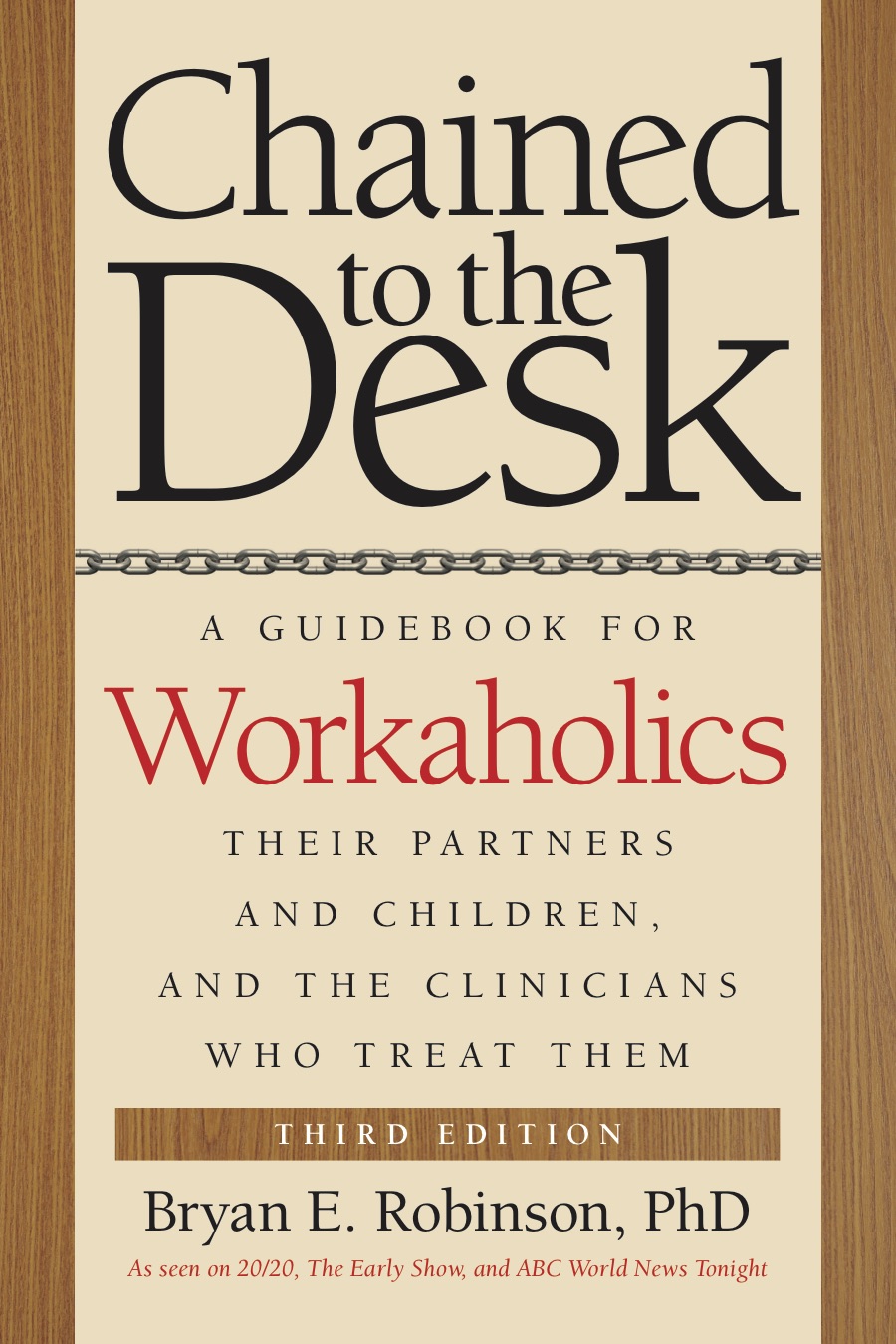Over the years, I have collected hundreds of case studies from self-described workaholics in my clinical practice. The following ten warning signs were synthesized from these case studies. All ten signs are not present in every case, and they may appear in various configurations in different individuals. But they are useful guidelines to help you recognize workaholism.
1. Rushing and hyperbusyness.
“As I’m walking out the door, I glance at my watch and realize I have ten more minutes before my next appointment. I just have to cram in one more thing. So I rush back to my desk, put in a call… and before I know it, fifteen minutes have passed. Of course, I’m late to the appointment.”
Nothing moves fast enough for Jim. The more items he can cross off his list, the better he feels. When a job is left hanging, he feels anxious and afraid. To curb his anxiety, he has to have two or three activities going at once. So when he has the phone in one hand, he’s pounding away on his computer with the other and mentally planning a third project.
If you’re a workaholic, you feel compelled to have many things happening at once and to engage in two or three activities simultaneously because it gives you the sense that you’re accomplishing more. To perform only one activity at a time feels underproductive. Typically, you schedule back-to-back appointments and don’t give yourself enough time to complete tasks, the pressures of which provide an adrenaline rush. Or you create minicrises, such as when a balky computer system or paper-clip shortage flips you out.
2. Need to control.
“I have to write, produce, and star in my life. I really don’t have time to develop this new account, but I know if I hand it over to someone else, it won’t be handled right. I’ll have to work nights to write and design this new ad campaign, but it’s worth it. In the long run, we’ll keep the client. I’d rather do it myself than waste time with a bunch of bad ideas from everyone else.”
Sally’s successful advertising agency is built on her own strength. As a work-addicted employer, she has trouble delegating authority. Her need to control her life is prompted by insecurity; she’s uncomfortable in unpredictable situations. Solo working gives her security. Projects come with a beginning, middle, and end. When she’s in control of all three stages, she feels like her entire life is in control.
When you’re chained to the desk, you fear that delegating tasks or asking for help will be perceived as signs of weakness or incompetence. And once something is out of your hands, you feel a loss of control. So you can’t and won’t ask for help. You tend to overplan and overorganize through work so that your environment feels predictable, consistent, and controllable– all of which inhibit spontaneity and flexibility.
3. Perfectionism.
“I think I’m superhuman. I can’t be content to accomplish something without laying the groundwork for something else. Fearing that I’ll somehow fall behind or get out of control, I constantly have to be striving to accomplish some kind of goal or some block of work.”
Lyn judges herself and others by inhuman standards. In her view, there’s no room for mistakes. Anyone falling short of her idea of perfection is lazy. Even at home, Lyn is a critical judge: “This house isn’t clean enough. Who left crumbs in the den? You forgot to wipe your feet. If I’ve told you once, I’ve told you a million times, ‘Close that basement door when you come upstairs!’”
Chances are that if you’re a perfectionist workaholic, you’re difficult to work for and even more difficult to live with. You narrow your life to only those things at which you can excel. You judge yourself and others unmercifully. Your common sayings include “If you want it done right, do it yourself” and “If I do it, I know it’s been done the way I want it done.” Because of these superhuman standards, failure and anger at others for not meeting high standards are your constant companions.
4. Difficulty with intimacy and crumbling relationships.
“At rehearsals, I would imagine my smiling dad in the front row. He looked so proud of me. His imagined presence really motivated me to learn my part. But when it came time for the actual performance, he had an out-of-town business meeting. He promised to dash back from the airport to catch my second act. All through the first act, I was distracted by opening doors and shuffling feet. I’d look into the audience, searching for his face. But as always, his meeting ran over, and he missed my school play.”
If you’re anything like Sandy’s father, this wouldn’t be the first play you missed. You would have a pattern of forgetting, ignoring, or minimizing the importance of family rituals and celebrations. A family member might have to remind you about birthdays, reunions, holidays, and anniversaries. And even if you make it to an event, you might have trouble concentrating because your mind is back at the office. Wedded to work, you have little time left over for others.
5. Work binges.
“I self-impose deadlines all the time. The price I have to pay for procrastinating just isn’t worth it. I go nuts. I panic. I can’t sleep. I have such anxiety until a project is completed. So finally I just buckle down and do it. I get in this altered state where I chain-smoke, don’t eat, screen all of my phone calls, and avoid sleep. When I’m done, it’s like crawling out of a work cave. I look and feel pretty disgusting. But with that finished project in my hand, nothing else seems to matter.”
Chances are you’ve occasionally worked overtime to meet a deadline. But when you’re a workaholic, you strangle yourself with unrealistic deadlines and work binges to complete projects. You would rather work nonstop for days than spread tasks out over a reasonable time period.In extreme cases, you might mimic the alcoholic who stashes booze wherever he goes. Instead of hiding your booze, you shove a laptop into suitcases or under car seats. Even at leisure events, after promising not to work, you slip out your iPhone or shuffle papers inside pant or skirt pockets. It’s as if you need a work “fix” everywhere you go.
6. Restlessness and inability to relax.
“I always have this annoying voice in my head. It tells me I don’t have the right to relax or unwind. This voice says, ‘Look, fun is a waste of time. What do you have to show for it? Go do something productive, you jerk.’”
This symptom can show up when you feel guilty and useless whenever you are doing something that doesn’t produce results. If you’re exercising, cleaning, or doing a job-related activity, you feel okay. But if you’re hanging out with friends, you might feel restless and irritable. Leisure activities are viewed as a frivolous waste of time, and you become so restless that you turn hobbies and recreation into productivity or money-making ventures.
7. Work trances and “DWW.”
Work trances or brownouts are comparable to the alcoholic’s blackouts. During a work trance, you have memory lapses during long conversations because you’re preoccupied with work. You tune out the here and now. Driving while working mentally (DWW) can cause you to drive through stop signs or past designated points on your route. Busily focusing on tomorrow’s presentation, you might have trouble paying attention to the road. Chances are if you work and drive, you have a faulty driving record. Melanie described one work trance this way:
It was my boyfriend’s birthday, and I’d spent most of the day with him. We were supposed to have dinner together. He was even going to cook. But just before dinnertime, I became so anxious I had to get out of his apartment. I hadn’t done one work-related thing all day I told him I needed to run home to change clothes. But once in my car, I found myself driving toward my office. I told myself I would merely type a few paragraphs and go over tomorrow’s appointments. I don’t remember the three hours that passed. It was 9:00 p.m. when I rushed to my car and floored it back toward his apartment. I was stopped by a police officer for speeding. I tried to explain my situation to him, but to no avail. When I finally made it back, my boyfriend had already eaten his birthday dinner alone. I felt so terrible. Yet even worse, I didn’t know why I did it.
8. Impatience and irritability.
Since time is your most precious commodity as a workaholic, you hate to wait. You’ll try almost anything to get to the front of the line at the grocery store, restaurant, or movie. You’re easy to spot at the doctor’s or dentist’s office– the one hypnotically gazing into a smart phone or with an open laptop, pad of paper, and a fast-scribbling pen.
In the long run, your impatience can result in impulsivity and premature decisions. You might start projects before gathering all the facts. You make avoidable mistakes because you bypass research and exploration.
9. Self-inadequacy.
“Work was my security, promising to fill the hours and give me purpose, meaning, and self-esteem. But as soon as a project was done, the emptiness, unrest, and depression returned. The only time I felt good about myself was when I was producing ‘things’ so that I could constantly prove that I was okay.”
Natalie gets a temporary high when she completes a project. In between achievements, she feels empty and lost. This feeling of inadequacy bothers her until she is immersed in her next project. Work is the one thing that used to bring her love and attention from her parents when she was younger. She still believes she has to prove herself in order to be accepted by others.
As a workaholic, you seek self-worth through performance and achievement. Your sense of inadequacy and poor self-esteem cause you to emphasize production with concrete results that give you a temporary high and feeling of value.
10. Self-neglect.
Self-care is at the bottom of your list if you’re a workaholic. Your job trumps taking care of yourself. You pay little attention to your physical condition, which is probably on a downhill slide. And nutrition, rest, and exercise are no-shows in your life. When coping mechanisms such as chain-smoking, caffeine abuse, and compulsive eating are added to the picture, your health deteriorates further.

Follow us here and subscribe here for all the latest news on how you can keep Thriving.
Stay up to date or catch-up on all our podcasts with Arianna Huffington here.


